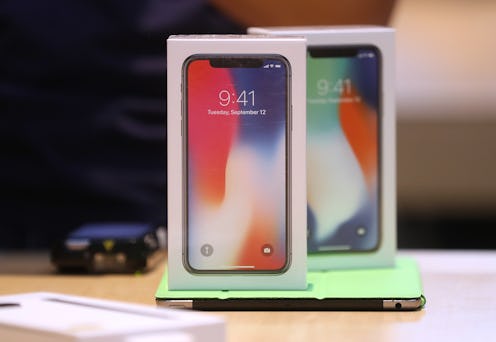Life
You Can Store Your Medical Records On Your iPhone Soon & Here’s Why That’s A Big Deal

When Apple rolls out iOS 11.3, it will come with a significant update to the Health app. Apple announced on Jan. 24 that it is partnering with hospitals and clinics to allow users to consolidate their medical records from multiple providers and store them in the Health app on their iPhone. Users will be able to access their records at any time and will receive a notification when their records are updated, Apple said in a press release. And, most importantly, this new Health app feature will be free.
Apple has so far partnered with 12 hospitals and clinics, but plans to add more before 11.3 debuts this spring. In the new Health feature, users' records will be "organized into one view covering allergies, conditions, immunizations, lab results, medications, procedures and vitals," Apple said in its press release.
Stephanie Reel, Chief Information Officer at Johns Hopkins Medicine, which has partnered with Apple, said in the press release that "[s]treamlining information sharing between patients and their caregivers can go a long way towards making the patient experience a positive one."
A 2017 opinion article from the American Medical Association (AMA) revealed that in many states, AMA researchers found that healthcare providers can and do, per HIPAA regulations, charge patients for copies of their medical records — "$111.68 for a copy of your 100-page file in Georgia or $218.70 for 150 pages in Minnesota," reported Forbes. That means "'[i]f the patient earns Georgia’s minimum wage of $5.15, he or she will need to work more than 21 hours' to buy a copy of that 100-page file."
What's more, AMA researchers also found that online patient portals don't solve the problem, because they often give less information than full medical records and can be missing clinical notes from healthcare providers. They concluded that broader access to medical records would be important, improving situations where patients must seek care outside their usual network (if someone is injured while across the country on vacation, for example) and helping patients better understand their treatment overall, allowing them to ask informed questions about medical decisions their healthcare providers are making.
The HIPAA laws that permit healthcare institutions to charge "reasonable" and "cost-based" fees for access to medical records are primarily aimed at helping protect patients' privacy, but the Health app will address safety and security as well. Apple said in its press release that all Health records will be "encrypted and protected with the user's iPhone passcode."
Darren Dworkin, Chief Information Officer at Cedars-Sinai Medical Center, said in Apple's press release that Apple's secure, trusted platform makes the tech giant "uniquely positioned to help scale adoption" of mobile health records access, something Dworkin said Cedars-Sinai has been interested in "for some time."
The goal for Apple is to "help consumers live a better day," Apple's Chief Operating officer, Jeff Williams, said in Apple's press release. "We've worked closely with the health community to create an experience everyone has wanted for years — to view medical records easily and securely right on your iPhone." Williams added, "By empowering customers to see their overall health, we hope to help consumers better understand their health and help them lead healthier lives."
Institutions that are already partnered with Apple and whose patients will be able to access the full benefits of the new Health feature upon rollout include Johns Hopkins Medicine, Cedars-Sinai, Penn Medicine, Geisinger Health System, UC San Diego Health, UNC Health Care, Rush University Medical Center, Dignity Health, Ochsner Health System, MedStar Health, OhioHealth, and Cerner Health Clinic.
The Health app update will roll out with the rest of iOS 11.3 this spring.